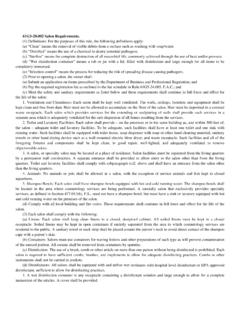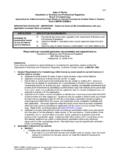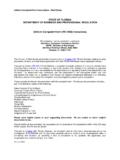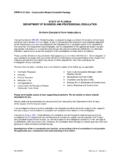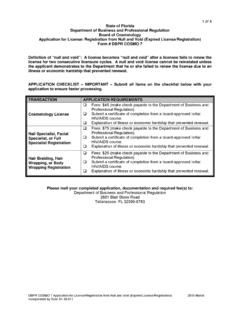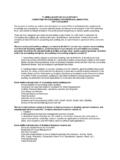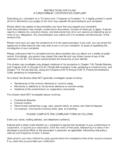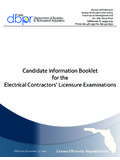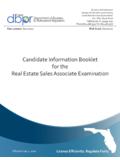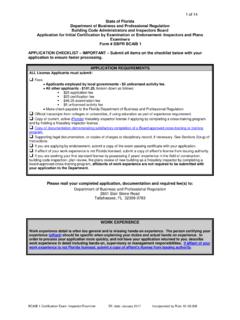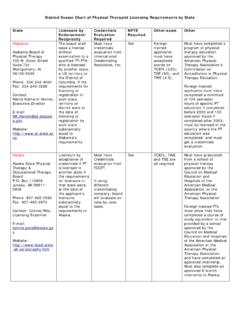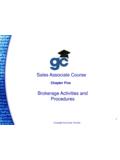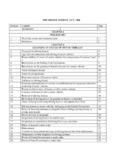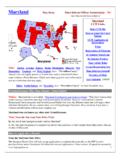Transcription of abt frequently asked questions 001 - Florida …
1 Division of Alcoholic Beverages and Tobacco FAQs - frequently asked questions licensing -related FAQs Tax-related FAQs Other FAQs licensing -related FAQs 1. What kind of license do I need to sell alcoholic beverages? Answer: If you wish to sell beer or wine, you can purchase a consumption-on-premise license or a package license. There are no restrictions on the number of licenses issued to sell beer and wine. If you wish to sell liquor, a quota license must be obtained. These are limited in number throughout the state, based on county population. There are also various special licenses that are allowed to sell liquor, such as restaurants, but specific requirements must be met for those licenses. To view the various types of alcoholic beverage and tobacco licenses available and applicable fees, you may visit: and 2. I own a restaurant, and wish to sale alcoholic beverages; what kind of license do I need?
2 Answer: A special (SRX) restaurant alcoholic beverage license can be obtained (if certain requirements are met) at any time, and is an exception to the quota license restrictions to number of licenses per county. The SRX license allows you to sell beer, wine, and liquor for consumption-on-premises, in connection with a restaurant. However, a restaurant must derive 51% of their revenue from food 1. and non-alcoholic beverages to qualify for this special license, along with other requirements. If this percentage cannot be met and maintained, the restaurant would not qualify for the special license and would then be required to obtain a regular (quota) license to sell liquor. [Reference: ]. 3. How much does an alcoholic beverage license cost? Answer: The annual license fee for an alcoholic beverage retail license ranges between $28 and $1,820, depending on the type of beverages you wish to sell, and the county in which your business will be located.
3 To view the various types of alcoholic beverage and tobacco licenses available and applicable fees, you may visit: and 4. How can I obtain a license to sell alcoholic beverages? Answer: There are several methods to obtain a license to sell alcoholic beverages. Each method includes the completion of a license application form, which may be obtained from the Division. Application forms, and additional information on completing an application form, may be requested from any ABT licensing office. The application form may be picked up at one of our offices, mailed directly to you, or found on the Internet at: or on the department's main page at: 2. You may select the APPLY FOR/UPDATE LICENSES option, which will take you to a page where you can select the general license category and see a checklist of requirements, which will include access to the application form. Once completed, the application may be mailed to your local ABT licensing office, hand-delivered to your local ABT licensing office, sent by either regular or overnight mail to the Tallahassee Central licensing office, or you can make an appointment with one of our Division licensing staff.
4 5. What is a quota license? Answer: For every increase in the population of a county by 7500 residents, a new quota license is created. In order to obtain a quota (liquor) license, you must either buy an existing license, or enter the quota drawing to win the right to apply for a quota license. The winner may then apply for the issuance of the new license. For more information on "quota" licenses, and describe the requirements and conditions of this type of license. To retrieve an application for the quota drawing, access the Internet at: lientCode=4009&XACT_DEFN_ID=7135. 6. How much does a quota license cost? Answer: In addition to the annual license fee, there is a one-time (Hughes Act) fee of $10,750. This fee is used for alcohol and drug abuse education, treatment, and prevention programs. [Reference: ]. In addition to the license 3. transfer fee (not to exceed $5000) [Reference: (3)(a)], when purchasing an existing license from a current owner, the price can vary.
5 The State does not set the price for quota licenses sold on the open market; the price is usually dictated by supply and demand. 7. What is the Hughes Act fee? Answer: The Hughes Act refers to a fee of $10,750, which is collected from each entity that is issued a new quota liquor license. This fee is imposed on an initial issuance of a license only, and is in addition to the annual license fee. The revenues from this fee are used for alcohol and drug abuse education, treatment, and prevention programs. [Reference: ]. 8. How long does it take to obtain an alcoholic beverage license? Answer: Processing time for a license can vary depending upon the complexity of the type of license being purchased. Filing a complete and accurate application can decrease the processing time. The Division is required to process a completed application within 90 days of receipt and acceptance. [Reference: ].
6 9. I would like to apply for a license to sell alcoholic beverages. Is there any way that I can start serving alcoholic beverages immediately? Answer: Upon delivery of a completed application which does not on its face disclose any reason for denial, the applicant may purchase a temporary license at a cost of 4. $100 or 1/4 the annual license fee, whichever is greater, for new and increase in series applications. The temporary fee for transfer applications is $100. [Reference: ]. Once the temporary license is issued, the licensee may begin sales of alcoholic beverages immediately. 10. Where do I go to apply for a license? Answer: There are several ways to file an application to obtain an alcoholic beverage or tobacco license. The application may be mailed to the local Division office, hand delivered to the local Division office, sent by regular or overnight mail to the Central licensing office, or by making an appointment with our licensing personnel.
7 A list of District office locations and phone numbers may be found at: 11. Can a beverage license be transferred from county to county? Answer: A license to sell beer and wine can be transferred from county to county. A. change of location fee is applicable. A license to sell liquor cannot be transferred out of the county in which it was initially issued, due to the limitation of the number of licenses for each county. [Reference (1) and ]. 5. 12. I belong to a non-profit civic organization. As part of a fund-raiser, can we sell alcoholic beverages? Answer: Yes, non-profit civic organizations, charitable organizations, municipalities, and counties can obtain a temporary permit for the sale of beer, wine, and liquor for consumption on premises only, and for a period not to exceed 3 days per event. With the exception of small areas within specific counties which are allowed to have an additional number of permits per calendar year, each non-profit organization may obtain up to 12 such permits per calendar year.
8 [Reference ] Areas of exception can be verified by going to the division's web page and reviewing the One, Two, Three Day Permit (ODP) Special Acts. 13. Have the requirements for a restaurant license in Winter Park, Florida changed? Answer: Yes, the chapters of law pertaining to exemptions for special licenses in the City of Winter Park, Orange County, were repealed during the 2015 legislative session. The issuance of special alcoholic beverage licenses for restaurants, hotels, motels, and motor courts in Winter Park are now subject to General Law. 14. I am interested in placing a vendor's license in a railroad transit station. Can I do this and what is the license fee? Answer: The 2016 Legislature has created a special license category that allows vendors in a railroad transit station to keep for sale and to sell beer, wine, and liquor upon the payment of an annual license tax of $2,500.
9 The vendor license may not be transferred to locations 6. beyond the railroad transit station. The alcoholic beverages sold are for consumption on the licensed premises, and may be consumed in all areas within the railroad transit station. [Reference: (22) and (2)]. 15. Can schools sell alcoholic beverages with their culinary arts programs? Answer: The 2016 Legislature has created a special license category for culinary education programs that allows the sale and consumption of beer, wine, and liquor on the licensed premises of the culinary education program. The culinary education program must be provided by a specific state university, college institution, or career center as a public food service establishment which offers, prepares, serves, or sells food to the general public, and which is inspected by a state agency for compliance with sanitation standards. If the culinary education program provides catering services, this special license allows the sale and consumption of alcoholic beverages on the premises of a catered event at which the licensee is also providing prepared food.
10 The license fee for the special culinary education program license is $1,820 annually. The license does not permit sales of alcoholic beverages by the package for off-premises consumption. [Reference: ]. 16. I have applied for an alcoholic beverage license but I do not have a location to open for business yet. Can I put the license on hold until I get the building completed? Answer: The Florida Statutes require a quota alcoholic beverage liquor license issued after September 30, 1988, to be open for business to the public for sales of authorized alcoholic beverages during regular and reasonable business hours for at least 8 hours a day for a period of 210 days or more during any 12-month period. This period begins 6 months after 7. the acquisition of the license by the licensee. The division will grant a one-time waiver or extension of the requirements for a period up to 12 months.
